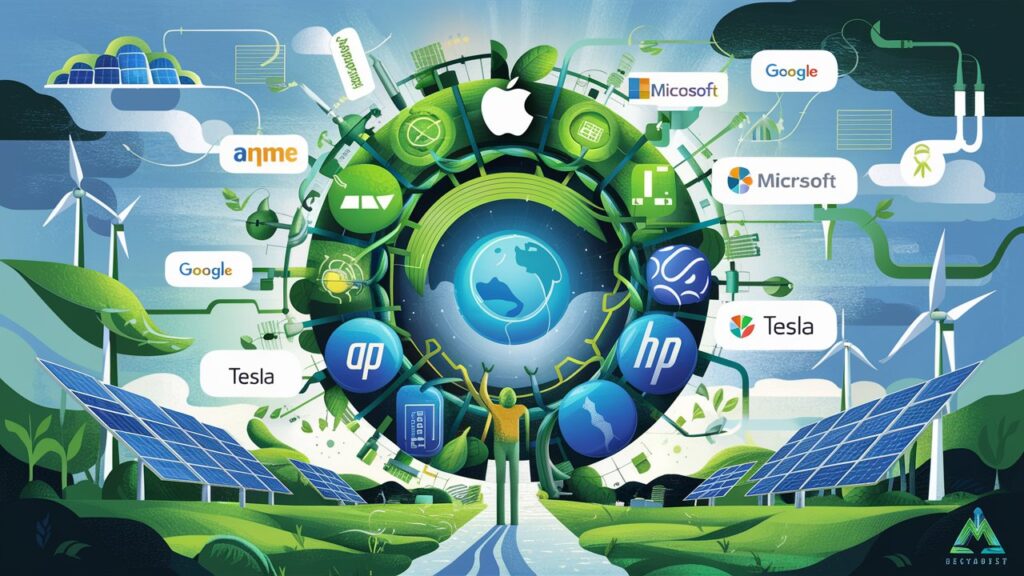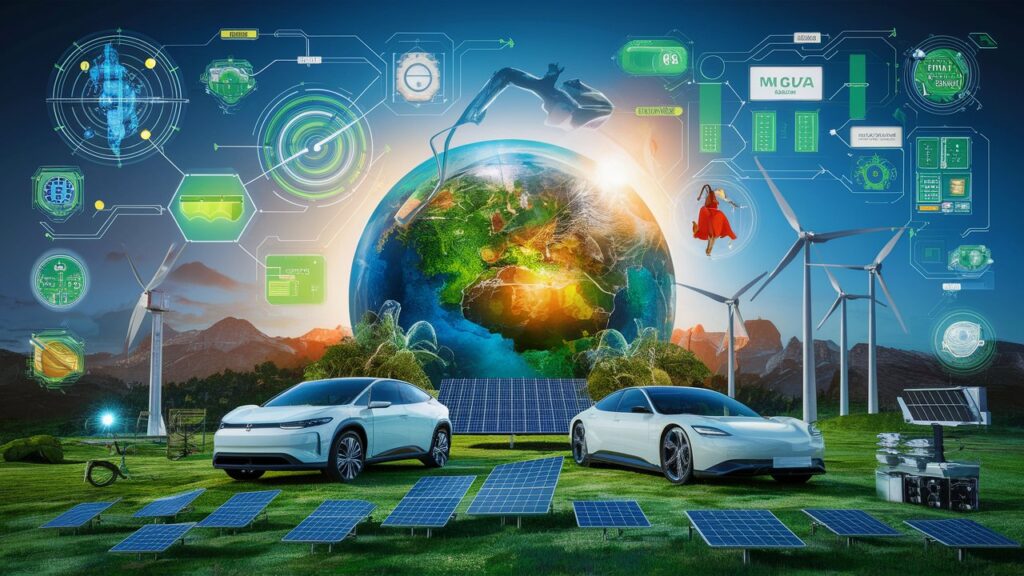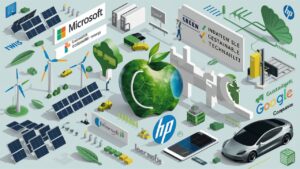Sustainable Tech Companies: Eco-Friendly Innovators
Technology is about more than simply innovation and convenience in the fast-paced world of today. It’s also about sustainability. So what does sustainability imply in the tech industry, and why is it important? The primary goals of sustainable IT companies are to provide goods and services that lessen their negative effects on the environment, preserve resources, and encourage a healthy planet. They want to leave a planet that is worthy of being lived on by future generations by striking a balance between ecological responsibility and economic prosperity.
What Makes a Tech Company Sustainable?
Eco-Friendly Practices
Sustainable tech companies adopt eco-friendly practices in their operations. This includes minimizing waste, using non-toxic materials, and implementing energy-efficient processes.
Renewable Energy Usage
A key characteristic of these companies is their commitment to renewable energy. They often power their facilities with solar, wind, or other renewable sources to reduce carbon emissions.
Sustainable Product Design
These businesses’ ideologies revolve around sustainable product design, which includes energy-saving technologies and recyclable packaging. They concentrate on making goods with as little of an impact on the environment as possible.
Corporate Social Responsibility (CSR)
CSR initiatives are another hallmark. These companies engage in various activities that benefit society and the environment, such as community outreach, ethical labor practices, and environmental conservation projects.
Top Sustainable Tech Companies
Apple
Apple has made significant strides in sustainability. The company has achieved a net-zero carbon footprint for its global corporate operations and is working towards making its entire supply chain carbon-neutral by 2030.
Microsoft
Microsoft aims to be carbon-negative by 2030. Its comprehensive sustainability plan includes reducing carbon emissions, promoting biodiversity, and achieving zero waste.
Google’s commitment to sustainability is evident in its data centers, which are twice as energy-efficient as typical data centers. The company also invests heavily in renewable energy projects.
Tesla
Tesla is at the forefront of sustainable transportation. Its electric vehicles (EVs) are leading the charge towards reducing reliance on fossil fuels, and its solar products offer sustainable energy solutions.
HP
HP focuses on sustainable materials, energy-efficient products, and a circular economy approach. The company is dedicated to reducing its carbon footprint and promoting sustainability across its operations.
Apple: Leading the Way in Sustainability
Renewable Energy Initiatives
Apple has invested heavily in renewable energy, powering all its facilities worldwide with 100% renewable energy.
Recycling Programs
Apple’s recycling programs, like the Apple Trade-In, encourage consumers to return their old devices for recycling, helping to reduce electronic waste.
Environmental Responsibility Reports
Apple regularly publishes comprehensive environmental responsibility reports, detailing its progress and future sustainability goals.
Microsoft’s Commitment to a Greener Future
Carbon Negative by 2030
Microsoft has pledged to become carbon-negative by 2030, meaning it will remove more carbon from the environment than it emits.
AI for Earth Program
The AI for Earth program aims to solve global environmental challenges by providing grants and access to AI tools for researchers and organizations.
Water Conservation Efforts
Microsoft is also focused on water conservation, aiming to replenish more water than it consumes by 2030.
Google’s Green Innovations

Data Center Efficiency
Google’s data centers are designed to use as little energy as possible while still handling vast amounts of data, making them among the most efficient in the world.
Renewable Energy Projects
Google has committed to running its entire global operations on carbon-free energy by 2030.
Sustainable Supply Chain
In order to promote sustainability throughout its supply chain, Google works with suppliers to guarantee that they abide by high environmental and ethical requirements.
Tesla: Revolutionizing Transportation with Sustainability
Electric Vehicles
Tesla’s electric vehicles are a major step forward in reducing the automotive industry’s carbon footprint.
Solar Products
Tesla’s solar products, including solar panels and the Solar Roof, provide clean, renewable energy for homes and businesses.
Gigafactories and Energy Storage
Tesla’s Gigafactories produce batteries and energy storage systems that support the transition to renewable energy.
HP’s Sustainable Vision
Sustainable Materials
HP uses recycled materials in its products, such as ocean-bound plastics and post-consumer recycled content.
Energy Efficient Products
HP designs products that consume less energy, helping reduce the overall environmental impact of its devices.
Circular Economy Approach
HP promotes a circular economy by designing products for longevity, repairability, and recyclability, reducing waste and conserving resources.
Emerging Sustainable Tech Companies
Beyond the Giants
Numerous up-and-coming businesses are also making substantial contributions to sustainability, even if the digital titans are setting the standard.
Startups to Watch
Startups like Impossible Foods, which creates plant-based meat alternatives, and Climeworks, which develops carbon capture technology, are making waves in the industry.
Innovations in the Field
Innovative solutions from these companies include biodegradable electronics, AI-driven energy management systems, and more.
Challenges in Achieving Sustainability
Technological Barriers
Developing sustainable technologies often requires significant R&D investment, and not all companies have the resources to overcome these barriers.
Financial Constraints
Sustainability initiatives can be costly, and smaller companies may struggle to find the funding needed to implement these practices.
Market Acceptance
It might be difficult to persuade customers to choose sustainable items, especially if they cost more than traditional options.
The Role of Consumers
Demand for Sustainable Products
Consumers play a crucial role by demanding and choosing sustainable products, thereby encouraging companies to adopt greener practices.
Consumer Awareness
Increasing consumer knowledge of how products affect the environment can encourage them to make more sustainable decisions.
Supporting Sustainable Brands
Customers may facilitate positive change in the industry by endorsing brands that place a high priority on sustainability.
Government and Policy Influence
Regulations and Incentives
Governments can influence sustainability through regulations and incentives that encourage companies to adopt eco-friendly practices.
International Agreements
Global agreements like the Paris Agreement set targets for reducing carbon emissions and influence national policies and corporate practices.
Future Policies
Sustainability could be further promoted by future policies that include stronger environmental laws and more funding for renewable energy initiatives.
Future Trends in Sustainable Technology

Advancements in Renewable Energy
Expect to see continued advancements in solar, wind, and other renewable energy technologies, making them more efficient and cost-effective.
Sustainable AI and Machine Learning
AI and machine learning will play a growing role in optimizing energy use, reducing waste, and solving complex environmental challenges.
The Role of Blockchain
Blockchain technology can enhance transparency and efficiency in supply chains, promoting more sustainable practices across industries.
How to Support Sustainable Tech Companies
Choosing Eco-Friendly Products
Opt for energy-efficient products made from sustainable materials designed to last longer.
Investing in Sustainable Companies
Consider investing in companies prioritizing sustainability, contributing to their growth and success.
Advocacy and Awareness
Advocate for sustainability by spreading awareness and supporting policies that promote environmental responsibility.
Conclusion:
Sustainable tech companies are leading the charge towards a greener future, but achieving true sustainability requires a collective effort. From adopting renewable energy to designing eco-friendly products, these companies set an example for the rest of the industry. As consumers, our choices matter, and by supporting sustainable brands, we can drive significant change. The road ahead is challenging, but with continued innovation and collaboration, a sustainable future is within reach.
Frequently Asked Questions (FAQs)
What defines a sustainable tech company?
A sustainable tech company adopts practices that minimize environmental impact, such as using renewable energy, designing eco-friendly products, and engaging in corporate social responsibility initiatives.
How can consumers influence tech sustainability?
Consumers can influence tech sustainability by demanding eco-friendly products, supporting sustainable brands, and raising awareness about the environmental impact of their choices.
What are some emerging sustainable tech trends?
Emerging trends include advancements in renewable energy, sustainable AI and machine learning, and the use of blockchain for transparent and efficient supply chains.
How do government policies impact tech sustainability?
Government policies can drive sustainability through regulations, incentives, and international agreements that set targets for reducing carbon emissions and promoting renewable energy.
What are the biggest challenges for sustainable tech companies?
Challenges include technological barriers, financial constraints, and market acceptance. Developing sustainable technologies often requires significant investment and convincing consumers to adopt these products can be difficult.














Post Comment